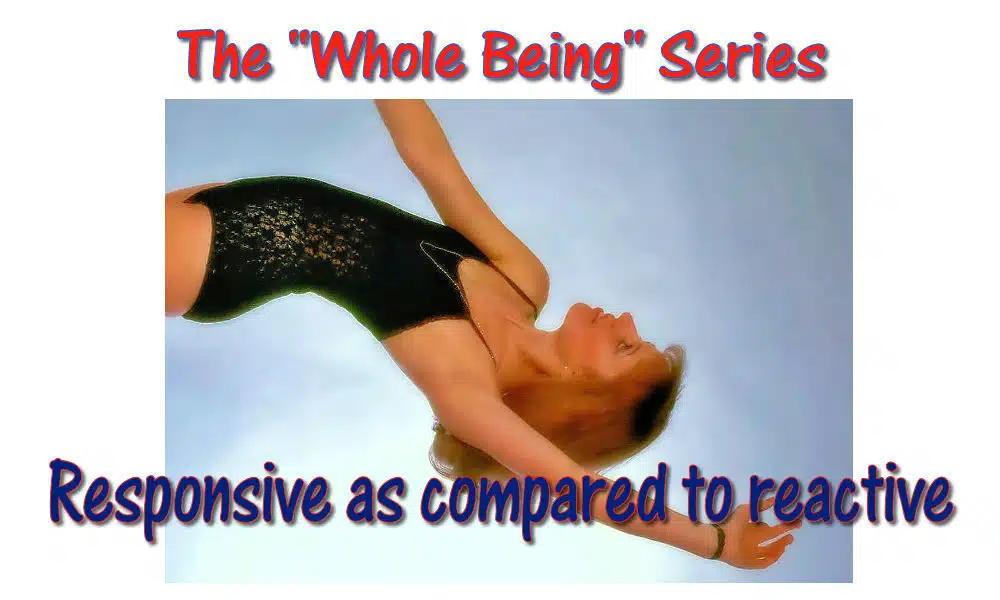- Whole Being-Focussed as compared to scattered
- Whole Being — Responsive as Compared to Reactive
- Whole Being — Self-centered as Compared to Selfish
- Whole Being — Honest as Compared to Indirect
Responsive as compared to reactive — reacting on autopilot is prevalent — always has been. Learning to breathe and then to reflect means that we can respond rather than react.

Psst! Hey!
** Want more great writing designed to help YOU to shift your behaviour?
** Want to learn how to find, build or deepen your principal relationship?
** Want to know more about Zen living and being?

Some years ago I was hanging out with a friend; we were comparing notes about medical procedures. She’d had a sigmoidoscopy the day before.
Aside from a gut ache, she was none the worse for wear.
She wondered what the Bodywork perspective would say about her lower digestive tract issues. (Her doctor had told her that she had “Irritable Bowel Syndrome.”
So, I answered her by asking her why she was reluctant to let go of stuff in her life, particularly the “crappy” stuff.
FYI,
- She was someone who dwelt obsessively on her past — on her (crappy) upbringing, her (crappy) past relationships, her physical appearance.
- She also obsessed about her future — she feared making decisions and was reluctant to change anything, lest she hate the result.
She said that she had recently called to her boyfriend by saying, “Come here.” “Go away.” “Come here.” “Go away.” When he asked her what was up, she said, “I just wanted to say out loud what I say to you in my head.”
Never satisfied, stuck, grumbly, in pain. And her bowels were pretty much the same.
Anyway, we ended up laughing about how much of her behaviour “just seems to happen,” outside of her consciousness, and therefore seemingly outside of her control.
What we are aware of only represents .00001% of the stimulus that hits our brain.
Most of us have had the experience of driving somewhere, getting there and not remembering the drive. This is a bald illustration of this process.
The signals are getting to the brain, and the link between brain and eyes, hands and feet operates the car, but it happens behind the scene — out of awareness.
Here’s an experiment: Find a staircase and walk up three stairs, then turn around. Facing down, hold onto the banister. Now, make yourself think about the process of walking down the stairs.
Think about your balance, which muscles have to be contracted or released, how to move your knees, hips, ankles and feet.
Here’s what you’ll discover: If you consciously think about it, chances are that you’ll have trouble going down the three stairs. Give yourself a shake and all will be well.
We have learned not to waste brainpower by endlessly re-remembering day-to-day stuff. You don’t want to have to think about how to brush and floss, or to tie your shoes.
But here’s the issue: marriages or relationships seldom get bogged down over tying shoes. Marriages break down, relationships or work situations break down because we treated the way we interact like we treat tying our shoes.
This is known as relating on auto-pilot
We engage without thinking. We hold a view about how to relate — a pre-conceived notion — locked away in the sub or unconscious, and what we do or say just tumbles out.
We deal with someone’s tone of voice or a situation the same way each time. Just like good little robots.
We react instead of responding.
This despite the fact that no conversation has to come out the same, and no situation is ever the same.
When I speak about or write about relationship issues I suggest paying attention, talking honestly with one’s partner, and shifting focus from autopilot to consciously working on relating.
If people do that, they almost always enact a quite different response — a non-auto-pilot response.

No question, people do slide back into auto-pilot. They slide back precisely when they stop paying attention to what is actually happening and go back to “reacting at” as opposed to “responding with” each other.
This is OK, as well as predictable — all they have to do is to remember to start paying attention again.
I once worked with a client, the wife of the pair. She was in the midst of deciding whether to leave the marriage.
He wouldn’t come for therapy, as he had decided that she had all the problems. Never mind that it takes two to make or break any relationship.
Ultimately, he showed up for one session. He tried to move his chair over next to me; he said he would help me “fix” his wife.
He was quite upset when I made him move his chair, while asking him how his own arrogance and single-minded focus had contributed to the ruin of the marriage.
He didn’t get it. He parroted the same words; he blamed her for not doing things his way. He wasn’t at all interested in who she was. He was only interested in changing her into who he wanted her to be.
But, and I stress this, he was not consciously reactive. He’d made a decision, long ago, that he was right and she was wrong. Everything he did was dedicated to proving this point, NOT to improving the relationship.
I just love people like him (not!) — I usually get to the point of saying, “If you are so wise and all-knowing, why have you never had a successful relationship?” Seems to me that wisdom should create results the person actually wants.
Unless he is getting what he wants. A failed relationship so he can feel like a martyr.
Today’s concepts are reaction as compared to response. I just thought of another definition.
- A reaction always has to do with what was done in the past and is driven by regret or fear of the future.
- A response, on the other hand, is located in the present moment, and is based upon a current interpretation, while also based upon a principle.
Example: You’ve had bad relationships. You react to conflict by replaying past hurts; you then decide to get revenge, and go on autopilot, reacting to everything with aggression.
To change this, you must declare a principle —
“Everything I say and do from now on will be directed toward relating well (from your side, as that’s all you can control.) As a stimulus happens, I stop, remember my principle, and form a response based upon relating well.”
You may not want to, as your reaction is still in place, screaming, “Make the asshole pay!” but you freeze that reaction and choose another way, in the present moment, that mirrors your principle. You do this again and again.
Try paying attention to the way you engage with others, and pay attention to what you say to yourself. Notice how much of what crosses your lips and mind is the same mindless drivel of criticism and judgement.
Then, ask yourself, “What am I trying to accomplish by thinking or saying that?” Ask yourself what your response would be, if your goal was to consciously know yourself and strengthen your relating.
Ask yourself how often your mouth runs off without the active participation of your brain. Shift, and try it another way. Then, do it again. And again.
Eventually, destructive habits can be changed, but only if you pay attention.
